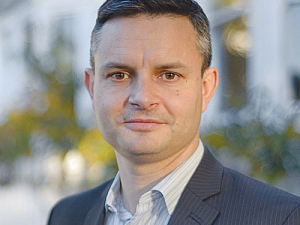DairyNZ Levy Vote Underway as Chair Highlights Seven-Fold Return
Voting has started for the renewal of DairyNZ's milksolids levy.
 Climate Change Minister James Shaw says New Zealand's dairy industry needs to do more to improve greenhouse gas emissions.
Climate Change Minister James Shaw says New Zealand's dairy industry needs to do more to improve greenhouse gas emissions.
Climate Change Minister James Shaw says New Zealand dairy is the world's lowest greenhouse gas emitter but that's not good enough.
“We cannot say that this is as good as it gets and that we can’t do anymore,” Shaw told the DairyNZ Farmers Forum in Hamilton today.
Shaw noted that the sector’s emission has dropped from 0.88/kg carbon dioxide equivalent/kg of product to 0.75/kg.
But he points out that while we are improving emissions per unit of production, the total volume of emissions still matters.
“That’s because it’s the total amount that makes the difference," he says.
Shaw praised the work done by the dairy sector, including its climate change ambassadors and through He waka eke noa- the world-first partnership between the farming industry and government, aimed at building a framework to reduce agricultural emissions.
Shaw says the NZ dairy sector is extremely innovative in a competitive global environment.
“The sector has in the last few years demonstrated its commitment to making a difference,” he says.
About 400 farmers are attending the one-day event.
Agrisea NZ has appointed Craig Hudson as it's new chief growth officer.
State farmer Landcorp, trading as Pamu, is a forecasting a full-year net profit of around $100 million.
Tony Aitken, chief executive of Ruralco, has been awarded the Excellence in Business Leadership Award at the ANZ Business of the Year Awards.
Global trade has been thrown into another bout of uncertainty following the overnight ruling by US Supreme Court, striking down President Donald Trump's decision to impose additional tariffs on trading partners.
Controls on the movement of fruit and vegetables in the Auckland suburb of Mt Roskill have been lifted.
Fonterra farmer shareholders and unit holders are in line for another payment in April.